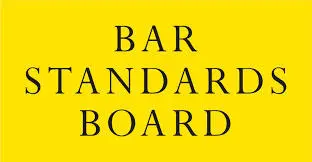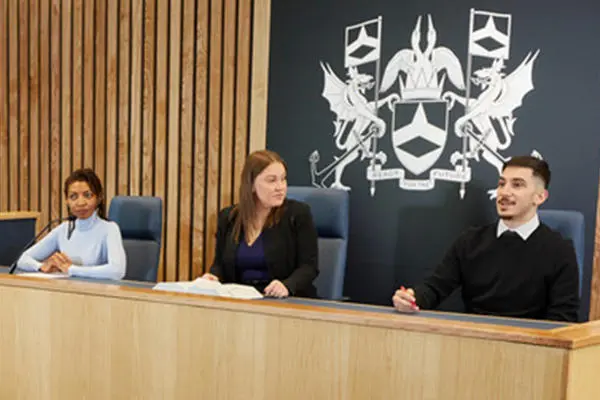
LLM Professional Legal Practice
Embark on your journey to becoming a solicitor with full SQE 1 and 2 preparation.
Find out more
Gain the essential skills, knowledge, and networks needed for a dynamic career in law or business.
Contact international admissions
Email: Call:Solent University’s LLB delivered through the Solent Law School, places a strong emphasis on professional practice, covering the foundation subjects essential for aspiring solicitors or barristers.
This is combined with the Solent Business School's real-world learning curriculum and business expertise, to equip students with versatile skills that can be applied across a wide range of business roles and industry sectors.
Studying LLB Law with Business opens up diverse avenues for legal practice, providing not only specialised legal knowledge but also transferrable skills tailored for the corporate and business landscape.
Our recent ground-breaking partnership with the College of Legal Practice enables you to undertake modules in your final year that give you credit towards your degree qualification and also in preparing for the Solicitors Qualification Examination One (SQE1), giving you a real head start if you’re considering becoming a solicitor.
Real-world learning and professional networks at the heart of the course; The Solent Law School is a founding member of Southampton City Law Network and has strong civic and business engagement collaborations across the city and UK.
These established connections allow us to offer a dynamic programme of events, workshops and guest lectures from a wide range of visiting professionals from various fields. Additionally, students benefit from work experience opportunities, that give you the chance to experience the legal and business professions and explore many exciting career paths.
You will have access to specialist facilities, too – from the University’s moot courtroom, which enables you to practice your legal skills in a realistic environment, to an extensive library of legal journals, case law and online materials.
Taught by experts within the Solent Law and Solent Business Schools, all who have strong links to the legal profession and business industry, the course gives you plenty of opportunities for practical experience and to develop your own professional network.
You'll will be encouraged to explore a wide-range of legal processes and the fast-changing business environment, in blend of theory and practice. This approach helps to develop habits of lifelong learning, to not only support your career aspirations but also, to nurture individuals into future leaders and global citizens.
If you’re looking to study our law with business degree but don’t have the relevant qualifications or experience, the business and law foundation year will help you develop the core skills and knowledge to progress. Find out more about the business and law foundation year.
This course also offers the option of a placement year. A placement year allows you to put what you've learned in your first and second years into practice in the workplace, gaining valuable real-world work experience before you graduate. Our course and placements teams will help you find the perfect industry placement in your chosen field.
Recognised by:

Recognised by:

This degree is ideally suited to students looking to pursue a career as a solicitor or barrister and also to those seeking a career in other legal and business professional environments, from commerce to the civil service.
It is also ideally suited if you want to develop strong business skills and prepare yourself for a successful career in a range of business industries – studying a curriculum that is not just about theory, but focused on real-world application.
You may not be sure yet which area of law, business or a mix of the two will suit you, but many industries are suitable - from social enterprise, charity, government, big local, global business or a smaller entrepreneurial firm or start-up.
Many students focussing on law, go on to train as a solicitor or barrister, while others pursue careers as legal executives, company secretaries or licensed conveyancers, or in areas such as business, property management and marketing, taxation, legal and financial compliance, local and central government, the police service, or paralegal work.
The University cannot guarantee any particular members of staff will teach specific aspects of the course in the future, but will endeavour to ensure the teaching team maintains their balance of experience and qualifications.
Law students have access to the moot court room to practice their courtroom and debating skills in a real-world environment.
Students also have access to a dedicated law collection in our Mountbatten Library, plus on- and off-campus access to a broad range of subscriber law databases, including major collections from Westlaw, Lexis Library and i-Law – providing access to law reports, legislative material, and academic journals. Our vibrant campus brings state-of-the-art facilities to enhance your learning and elevate your student experience. Our award-winning teaching building, The Spark is centred around students and offers a stimulating study environment with flexible learning spaces.
Broaden your horizons by adding an international dimension to your CV – essential to achieving success in today’s fast-changing, global environment.
Studying, working or volunteering in another country could be the experience of a lifetime. Enhance your degree by developing important global skills such as knowledge of other countries, language skills, intercultural awareness, adaptability and confidence.
For more information, please email international.mobility@solent.ac.uk.

Develop your knowledge of civil and criminal disputes, from alternative dispute resolution through the practice and procedure of formal litigation – covering everything from disclosure and costs to criminal sentencing and appeals.
Develop your analytical skills and your understanding of public law, examining the basic principles of the UK and EU constitutions, and of the relationship between EU law and national law.
Expand your understanding of key managerial concepts, including organisational purpose and structure, leadership, corporate culture, ethics, strategic decision-making, diversity and employment law - through case studies from today’s business environment.
Develop insight into the law and procedure relating to contractual obligations, from forming or ending a contract to assessing validity and remedying breaches – laying strong foundations for a career in commercial law.
Explore substantive law on a range of offences and defences; study key concepts and issues in criminal law, apply them in hypothetical scenarios, and learn to critically evaluate them.
Explore civil wrongs, investigate the procedures for bringing an action, and discover the interaction of legal, social and economic factors on this exciting mix of common law and statutory law.
Investigate how businesses and commerce operate within both external and internal legal frameworks, from structures of business organisations, corporate governance and dispute resolution to principles of taxation and professional ethics.
Get to grips with trust law and practices. Learn about the different types of trusts, the powers of trustees, beneficiary rights, tax liability reductions, anti-money laundering legislation and more.
Property law covers everything from rent reviews or terms of lease to planning. Learn about lease agreement conditions, breaches, subletting and resale, and explore the complexities of permitted development and planning enforcement.
Informed by Association for Project Management (APM) standards, this module will teach you best practice including stakeholder engagement, communications and leadership – as well as exploring contemporary challenges in project management. You’ll also have the opportunity to undertake the Project Fundamentals qualification for an additional cost.
To manage others, you need to reflect on self-management too. This module explores your self-management, personal values and journey, interweaving the essential management and leadership skills to successfully manage teams.
Please note: Not all optional modules are guaranteed to run each year.
Explore the changing landscape of employment law in the millennial age, from environmental and technological factors to equality and flexible working – and better negotiate your own rights in the workplace.
You will focus on the UK and EU substantive law in relation to copyrights, and you will consider the impact of international and European policy on the scope of these rights in the UK. You will investigate the economic justifications for copyright protection and a comparison with the USA in addition to the Hargreaves review and its potential implications.
Businesses need to be agile to adapt and thrive. On this module you will develop your emotional intelligence (EQ), intercultural competence (ICC), and understanding of people management to embrace diversity and inclusivity, and co-create productivity in an age of digital transformation.
Dive into the legal and practical aspects of land law. Learn about land registration and the various interests in and over land, as well as co-ownership, the conveyancing process, and more.
Learn how senior managers and chief executive officers identify, select and manage strategy. Critically evaluate a wide range of strategic management theories and models, and learn how to apply and implement them.
Please note: Not all optional modules are guaranteed to run each year.
The key areas of study in this module include the small business enterprise sector where you will look at what constitutes a small business and the typology of small business behaviour in relation to growth and management styles. This includes economic and political influences on small business trends along with key determinants of small business success and failure.
Develop and demonstrate your independent learning through a work-placement exercise report or traditional dissertation. Research and produce a written analysis that is professionally presented, articulately and logically argued, and supported by research.
This module explores how key concepts and theories of marketing can be applied to new markets and countries. You will analyse international markets, learn to understand cultural differences, and examine how businesses adapt marketing strategies for new markets.
Lay the groundwork for your studies with this essential introduction to law and the legal system – covering the nature of law, sources and institutions, and fundamental legal skills.
Contact international admissions
Email: Call:Solent’s curriculum framework builds on our unique, creative and applied approach to teaching. The transformation of students’ lives is at the heart of our mission as a university, and our curriculum – informed by the latest theory – reflects this shared educational vision.
Find out more
The student achievement team are on hand to help you succeed during your studies at Solent. They aim to contact you at key times during your time here with personalised information, advice and guidance, by email or phone.
The disability advice team provides information, advice and guidance for disabled students.
All students can access Succeed@Solent, Solent's online guide to getting better grades. It offers extensive, practical information and advice on topics such as academic writing, research and presentations.
The wide variety of areas of legal practice, includes specialist professions such as criminal law (police, criminology and social and probation work) or commercial law (including roles such as company secretaries, accountants, tax consultants and compliance officers).
Graduates with key business skills are also in high demand worldwide, follow broad and diverse careers and are often highly paid. Whatever the sector, every organisation needs individuals with a wide range of business skills in order to operate and excel, and those skills are highly transferable throughout your careers.
Solent University is a founding member of the Southampton City Law Network, and through the network, students have the chance to gain paid and unpaid work experience from local employers such as E3 Consulting and Lawdit Solicitors, and many law firms have Solent LLB alumni as trainee and fully qualified solicitors, company secretaries, trademark attorneys, legal executives, licensed conveyancers and paralegals.
The skills and experience you earn during your degree will leave you well placed to run your own successful business or rise through the ranks of corporate management, into senior positions and even running the organisation as CEO or GM.
Course content is tailored to suit the requirements of professional bodies and is designed to prepare you for the Solicitors Qualifying Examination (SQE) and the Bar Exam, giving you a real head start if you’re considering becoming a solicitor.

Graduate salary: £18,000 to £25,000
A paralegal with some experience (typically around three to five years') can expect a salary in the region of £30,000 to £40,000. Within larger firms it's possible for an experienced paralegal to earn up to £55,000, and in very rare cases up to £70,000.
Newly qualified solicitors: £28,000 to £68,000+
It is seen as good practice for trainee solicitors a minimum of £23,703 in London and £21,024 in the rest of the country. Starting salaries in large City firms can range from around £68,000 to £100,000. Starting salaries for newly qualified solicitors in private practices elsewhere in the country typically range from around £28,000 to £68,000. You can expect your salary to rise year-on-year as you gain more experience. If you become a partner in a firm, your salary could potentially reach in excess of £100,000. Partner salaries at Magic Circle, (London's five most prestigious law firms), and international law firms can be on average around £400,000.
Typical salary: £25,000 to £50,000
Starting salaries for trainees or newly qualified conveyancers are typically between £19,000 to £24,000, though are sometimes lower. After qualification and with around three years' experience, your salary may range from £25,000 to £50,000. In senior management posts, you can expect to earn between £35,000 and £55,000, with the potential to earn £65,000 or more as a partner or owner of a conveyancing firm.
The stated salaries are published on prospects.ac.uk.
The Solent Careers team is committed to getting students into great careers.
While you are studying, the team can help you with finding work experience or placements, link you with a mentor, check your CV, or offer one-to-one guidance.
We also have graduate job opportunities just for Solent graduates.

6th
UK uni for sustained employment
Longitudinal Educational Outcomes, 2022
Every student at Solent University will also have the option to study an additional Certificate in Practical Artificial Intelligence qualification alongside their course. Free of charge, the course ensures you'll be prepared for a fantastic and varied career after graduation.

Thinking about studying further than an undergraduate degree? Alumni can get 20% off their postgraduate study.

Embark on your journey to becoming a solicitor with full SQE 1 and 2 preparation.
Find out more
Designed for professionals looking to enhance their CV, this specialist master’s offers insight into real-world commercial law alongside the practical expertise to add value in business, management, compliance, legal, tech, HR and other roles...
Find out more
Get to grips with intellectual property law, copyright, and the fundamentals of modern commercial practice on this fascinating, highly career-focused master’s in law – ideal for business and management professionals looking to enhance their CV.
Find out moreThe tuition fees for the 2026/27 academic year are:
For further information, please visit our tuition fees page.
While most course costs are covered by your tuition fees, some essential resources and optional extras may need to be paid for separately. These additional costs are listed below. For advice on budgeting and managing your money, please contact student.funding@solent.ac.uk.
The 2026/27 additional costs are not yet available. For guidance, previous additional costs have been:
Optional costs
Solent University offers a range of bursaries and scholarships that provide financial assistance or waive fees for tuition or accommodation. Each bursary or scholarship has specific eligibility criteria. Check out our bursaries and scholarships pages to find out more.
Cost of living support
At Solent, we understand that the cost of living crisis may be of some concern. To help, we've put together some detailed information to show what support is available and how to make your money go further.
Graduation costs
There is no charge to attend graduation, but you will be required to pay for the rental of your academic gown (approximately £45 per graduate, depending on your award). You may also wish to purchase official photography packages, which range in price from £15 to £200+. Graduation is not compulsory, so if you prefer to have your award sent to you, there is no cost. Extra guest tickets will go on sale after results publication and will be sold on a first-come-first-served basis. The cost per ticket is currently £20. Please note, we do not guarantee there will be any extra tickets available to purchase.
Contact international admissions
Email: Call:Please select an option below:
As a general guide, we look for qualifications that are equivalent to the British high school A-levels.
If you are applying from outside the UK, find information about entry requirements, visas and agents for your country here.
For further information about EU qualifications, please see our course entry requirements document.
As a general guide, we look for qualifications that are equivalent to the British high school A-levels.
If you are applying from outside the UK, find information about entry requirements, visas and agents for your country here.
For further information about international qualifications, please see our course entry requirements document.
All international applicants need to be aware that the English language requirements to attend Solent University, and the English language requirements to obtain a visa from the Home Office, may be different. This means that if you meet the Solent University language requirement to gain a place on the course, you may still have to meet additional requirements to be granted with a visa by the Home Office.
We strongly advise all applicants to visit the Home Office website which outlines all the requirements for a successful visa application.
Full-time
Any student applying for the first year of a full-time/sandwich undergraduate course must apply through UCAS (University and Colleges Admissions Service). This includes mature, overseas and EU students.
Nearly all schools and colleges offer their students the facility of applying electronically through the UCAS website using 'Apply'; it may also be used by those applying independently in the UK and overseas. This facility and all course information can be found on the UCAS website: www.ucas.com.
Your application should reach UCAS by 31 January if you hope to enter a course the following autumn. Early application is advised for the most popular subject areas. Late applications may be made until the end of June. The UCAS Code for the University is S30, code name SOLNT.
Find out what happens after you apply
Contextual offers
Solent endeavours to offer learning opportunities to students from all backgrounds. When we receive and review an application, we take into consideration the context and personal circumstances of applicants when making a decision, which means our advertised entry tariff could be reduced.
Find out more about Solent's contextual offers
Top-up route:
We welcome applications from students currently studying a Foundation Degree, DipHE, HNC, HND or modules of an undergraduate degree course at another university, who wish to enter directly into Years 2 or 3 of one of our undergraduate degree courses. Please contact our admissions team for more information: contact us
Applicants who do not have English as their first language will be required to demonstrate an approved level of proficiency in the use of the English language. The agreed minimum requirements for this course are:
Qualifications are checked before enrolment, and international students must bring their original certificates or certified copies when coming to study at the University.
Pre-Sessional English programme
The University also offers a pre-sessional English programme for international students who wish to improve their level of English before starting a degree course.
Contact international admissions
Email: Call: